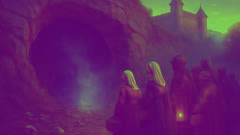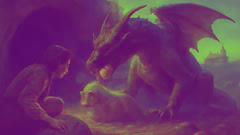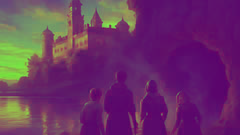Introduction
Under the amber glow of dusk, Krakow’s skyline rises, crowned by the noble silhouette of Wawel Castle perched on its limestone hill. For centuries, the castle’s turrets and ramparts have watched over the winding Vistula River and the city’s bustling market square. Yet, beneath the cobblestones and cathedral spires, whispers of an ancient terror coil through the city’s memory: the tale of the Wawel Dragon. This is a story steeped in the very heart of Poland, where legend and truth blend like the fog rolling off the river at dawn. In medieval times, when townsfolk huddled close behind stout walls, believing in the power of saints and the threat of shadows, Krakow was a beacon of trade and learning. But it was also a place beset by fear. Shepherds would vanish, cattle would be found scorched, and sometimes a strange, smoky wind would curl up from the caves beneath the castle hill. Mothers hushed their children with warnings of the beast that slumbered below. They described emerald scales glittering in torchlight, breath hot enough to wilt willows, and eyes burning like coals. The king, old and noble, listened with heavy heart to the pleas of his people, as the city’s prosperity waned and brave knights fell to the dragon’s hunger. It seemed as though no sword, no lance, could pierce the beast’s hide, and hope faded with every blackened field. But not all were content to cower in fear. In the labyrinthine streets below Wawel, among the bustling markets and fragrant bakeries, lived a young cobbler’s apprentice named Skuba. His hands were deft, his mind sharp, and though he owned little, his dreams were unyielding. He listened to the tales of the dragon, not with dread, but with a glimmer of curiosity. Why must Krakow always wait for heroes to arrive on horseback? Why could not courage spring from ordinary folk? And so, as the bells tolled vespers and fireflies danced along the riverbank, Skuba resolved to change his city’s fate. The path would be perilous, the danger real, but sometimes, courage is not the absence of fear, but the stubborn refusal to let fear rule. This is the legend of how a humble apprentice dared to outwit a monster and awakened hope for all Krakow.
Beneath the Hill: Krakow in the Dragon’s Shadow
The chill of early spring lingered in Krakow’s air, clinging to the stone walls and winding lanes that cradled the city. Beneath Wawel Hill, where the mighty castle perched like a crown, a sense of unease had taken root. Market vendors whispered as they set out their wares, glancing at the cave mouth on the hill’s southern face. It was there, legend said, the dragon made its lair—a gaping wound in the limestone, rimmed with soot and bones.

Few dared approach the cave. Even the king’s bravest knights had vanished inside, their armor later found scorched or twisted beyond recognition. The city’s priests led processions to bless the hill, waving incense and chanting prayers to ward off evil. Still, nothing seemed to placate the beast. By night, Krakow’s streets emptied early, and the sound of distant roars echoed over rooftops. Cattle pens stood empty, and villagers shuttered their homes as soon as the sun dipped behind the castle’s battlements.
The king’s council met in anxious sessions. Once, there had been talk of great feasts and tournaments, but now the topics turned to famine and fear. The city’s riverside meadows lay blackened where the dragon had feasted. Each season brought new tales: shepherds who vanished in morning mists, children awoken by nightmares of fiery eyes, and merchants who refused to enter Krakow’s gates. The city’s spirit withered under the dragon’s shadow, its people searching in vain for hope.
It was in this climate of dread that Skuba apprenticed in the cobbler’s shop near the Market Square. His master, old Piotr, was a craftsman of quiet dignity. While he stitched leather and hammered soles, he recited stories from his youth: tales of heroes and saints, clever animals, and tricks that bested giants. Skuba soaked in these tales, his mind whirring with ideas. He watched the knights parade through town, their armor shining but their eyes haunted. He saw how hope faded from the city’s gaze, and it made something inside him bristle.
One afternoon, as spring sunlight streamed through the shop’s small window, Piotr paused in his work. He placed a reassuring hand on Skuba’s shoulder and spoke softly: “Bravery isn’t always in the sword, lad. Sometimes it’s in what you make with your hands—and what you make of your mind.”
That night, Skuba wandered the edge of the city, pondering his master’s words. Down by the riverbank, he watched as the moon turned the water silver and shadows crept along the castle hill. The dragon’s cave yawned above, and Skuba shivered, not from fear but from the weight of an idea taking shape. He knew he was no knight, but perhaps that was his greatest strength. The beast expected armor and blades—what if it met with cunning instead?
Skuba returned to the city’s heart, passing by mothers comforting children and merchants counting dwindling coins. He heard their worries and felt their desperation. He resolved then to act—not for glory, but for the city he loved. As dawn approached, he began to gather what he would need: a sharp mind, a steady hand, and the courage to step where no one else dared.
The Apprentice’s Gambit: Cunning Over Claws
Skuba’s plan began not with steel or prayer, but with observation. For days, he watched the cave from a hidden vantage at dawn and dusk. He noticed the dragon’s patterns: it emerged at twilight, stretching its emerald wings with a yawn that sent tremors through the earth. Its scales gleamed in the dying light, and its breath curled in smoky spirals. It hunted at night—never at midday—and it seemed to prefer sheep or cattle over anything else.

Skuba gathered scraps of information from market gossip, learning how past attempts had failed. Knights had charged the beast head-on, only to be consumed by its flames. Hunters had set traps at the cave mouth, but the dragon’s senses proved too sharp. “You’ll never outfight a dragon,” his master Piotr had once said. “But perhaps you can outthink it.”
The apprentice spent his evenings in the shop, sewing quietly while his mind raced. He devised a plan both simple and perilous. If the dragon’s hunger was its weakness, perhaps it could be its downfall. He remembered tales of how wolves were tricked with poison and how clever animals used decoys to evade larger predators.
One morning, Skuba visited the city’s tanners and butchers, gathering scraps and offal. He fashioned a great sack from sturdy leather, filling it with the vilest refuse he could find—rotten meat, sulfur from the apothecary, a pinch of quicklime. He stitched the bundle tight, shaping it into the likeness of a fat sheep. The smell was foul, but Skuba forced himself to ignore it. His heart beat like a drum as he worked through the night, driven by purpose and a flicker of hope.
At dawn, he slipped away to the castle hill, keeping to the shadows. No one saw him but a few wary crows. With trembling hands, he dragged the decoy to the dragon’s cave and left it just outside the entrance, then darted behind a boulder to watch. The sun crept higher, and soon, the ground trembled—the dragon emerged, stretching and sniffing at the air. Its nostrils flared at the scent of meat.
The beast seized the sack in its jaws and swallowed it whole, barely pausing to chew. Moments later, a strange rumble echoed from its belly. The dragon staggered, confusion flickering in its fiery eyes. Smoke poured from its nostrils as the quicklime and sulfur began to work, reacting violently with the dragon’s stomach acids. Suddenly, with a thunderous roar, the creature lurched to the riverbank, gulping water in desperate gulps to quench the burning inside.
But it was no use. The reaction grew fiercer, and the dragon’s body convulsed. With a final bellow that shook the castle’s towers, the beast exploded in a cloud of smoke and flame, scattering scales across the hillside. Silence fell over Krakow—the city that had cowered for so long finally free from its tormentor.
Skuba emerged from hiding, his heart pounding in his chest. For a moment, he stood alone in the dawn light, watching as the river washed away the last traces of the beast. He felt a strange mixture of triumph and disbelief—he, a simple apprentice, had done what no knight or noble could.
News spread like wildfire. At first, no one believed the dragon was truly gone, but when villagers climbed the hill and found only scorched earth and scattered bones, hope blossomed anew. Skuba was hailed as a hero. The king himself summoned him to the castle, bestowing honors and rewards upon the humble apprentice. Yet Skuba remained modest, insisting he had acted out of love for his city and faith in the power of wit over might.
The people of Krakow celebrated with feasts and dancing, filling the streets with laughter and music for the first time in years. The city began to heal; its markets bustled once more, and children played near the riverbank without fear. The legend of the Wawel Dragon lived on—not as a tale of terror, but as a testament to the courage and ingenuity of ordinary folk.
Conclusion
Long after the cheers faded and the dragon’s bones were swept away by rain and time, the people of Krakow remembered Skuba’s deed. His story became a beacon for generations—a reminder that courage isn’t reserved for the mighty or the noble. Sometimes, the greatest heroes are those who listen, learn, and dare to imagine a different ending. The dragon’s cave still gapes beneath Wawel Hill, now a place of curiosity instead of dread. Children gather near its entrance to hear guides tell how a cobbler’s apprentice brought hope back to Krakow. Statues stand in Skuba’s honor, and the legend is woven into songs and festivals each year. The city endures, shaped by the courage of its people and the belief that even the darkest shadow can be overcome with wit and heart. And so, beneath Wawel’s watchful towers and beside the ever-flowing Vistula, Krakow’s spirit shines brighter than any dragon’s fire—a living testament to the power of hope and the triumph of ordinary courage.













